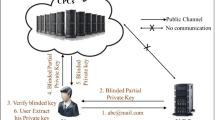Abstract
Authenticated group key agreement (GKA) is an important cryptographic mechanism underlying many collaborative and distributed applications. Recently, identity (ID)-based authenticated GKA has been increasingly researched because of the authentication and simplicity of the ID-based cryptosystem. However, there are two disadvantages with this kind of mechanism: 1) the private key escrow is inherent and 2) the Private Key Generator (PKG) must send client private keys over secure channels, making private key’s distribution difficult. The two disadvantages, particularly secure channels, may be unacceptable for secure group communications application. Fortunately, we can avoid both of them. In this paper, with bilinear maps on ECC, we present a new authenticated group key agreement protocol that does not require secure channels. The basic idea is the usual way of circumventing escrow: double key and double encryption (verification). The secret key of a user is generated by a key generation center (KGC) and the user collaboratively. Each of them has “half” of the secret information about the secret key of the user, and there is no secret key distribution problem. In addition, the computation cost of the protocol is very low because the main computation is binary addition.
Similar content being viewed by others
References
Ateniese G, Steiner M, Tsudik G. New multi-party authentication services and key agreement protocols. IEEE Selected Areas in Communications, 2000, 18(4): 628–639
Bellare M, Rogaway P. Entity authentication and key distribution. In: Proceedings of Crypto’93. Springer, LNCS 773. 1993, 232–249
Blake-Wilson S, Menezes A. Authenticated Diffie-Hellman key agreement protocols. In: Proceedings of SAC’ 98, Springer, LNCS 1556. 1998, 339–361
Bresson E, Chevassut O, Pointcheval D. Provably authenticated group Diffie-Hellman key exchange–the dynamic case. In: Proceedings of Asiacrypt’01, Springer-Verlag. 2001, 290–309
Hamey H, Muckenhim C. Group key management protocol (GKMP) architecture. RCF 2094, July 1997
Hamey H, Muckenhim C. Group key management protocol (GKMP) Specification. RCF 2093, July 1997
Li C-H, Pieprzyk J. Conference key agreement from secret sharing. In: Proceedings of ACISP’99, Springer-Verlag, LNCS 1587. 1999, 64–76
Bresson E, Catalano D. Constant round authenticated group key agreement via distributed computation. In: Proceedings of the 7th International Workshop on Theory and Practice in Public Key Cryptography (PKC’04), Springer, LNCS 2947. 2004, 115–129
Kim Y, Perrig A, Tsudik G. Tree-based group key agreement. ACM Transactions on Information and System Security, 2004, 7(1): 60–96
Steiner M, Tsudik G, Waidner M. Diffie-Hellman key distribution extended to groups. In: Proceedings of 3rd ACM Conf. Computer Commun. Security. 1996, 31–37
Steiner M, Tsudik G, Waidner M. Key agreement in dynamic peer groups. IEEE Trans. Parallel Distrib. Syst., 2000, 11: 769–780
Ateniese G, Steiner M, Tsudik G. New multyparty authentication services and key agreement protocols. IEEE J. Select. Areas Commun., 2000, 18: 628–639
Steiner M, Tsudik G, Waidner M. CLIQUES: a new approach to group key agreement. In: Proceedings of 18th Int. Conf. Distributed Computing Syst. (ICDCS’98). 1998, 380–387
Burmester M, Desmedt Y. A secure and efficient conference key distribution system. In: Advances in Cryptology-Eurocrypt’94, LNCS. 1994, 275–287
Choi K Y, Hwang J Y, Lee D H. Efficient ID-based group key agreement with bilinear maps. In: Proceedings of PKC’04, LNCS 2947. 2004
Zhang F, Chen X. Attack on two ID-based authenticated group key agreement schemes from PKC 2004. Information Processing Lett., 2004, 91: 191–193
Wang H J, Yao G, Jiang Q S. An identity-based group key agreement protocol from pairing. In: Proceedings of the 3rd International Conference on Availability, Reliability and Security, IEEE. 2008, 532–537
Chen L, Cheng Z, Smart N P. Identity-based key agreement protocols from pairings. Cryptology ePrint Archive, Report 2006/199
He Y Z, Han Z. An efficient authenticated group key agreement protocol. In: Proceedings of 41st Annual IEEE International Carnahan Conference on Security Technology. 2007, 250–254
Boneh D, Franklin M. Identity-based encryption from the weil pairing. Crypto 2001. LNCS 2139, Springer-Verlag. 2001, 213–229
Bellare M, Garay J A, Rabin T. Fast batch verification for modular exponentiation and digital signatures. In: Proceedings of Eurocrypt’98, LNCS 1403, Springer-Verlag. 1998, 236–250
Nalla D, Reddy K C. Identity based authenticated group key agreement protocol. In: Proceedings of Indocrypt’02, LNCS 2551, Springer-Verlag. 2002, 215–233
Choi K, Hwang J, Lee D. Efficient ID-based. group key agreement with bilinear maps. In: Proceedings of PKC’04, LNCS 2947, Springer-Verlag. 2004, 130–144
Shi Y J, Chen G L, Li J H. ID-based one round authenticated group key agreement protocol with bilinear pairings. In: Proceedings of 2005 International Conference on Information Technology: Coding and computing (ITCC 2005). 2005, 1: 757–761
Author information
Authors and Affiliations
Corresponding author
Rights and permissions
About this article
Cite this article
Lv, X., Li, H. ID-based authenticated group key agreement from bilinear maps. Front. Comput. Sci. China 4, 302–307 (2010). https://doi.org/10.1007/s11704-009-0063-x
Received:
Accepted:
Published:
Issue Date:
DOI: https://doi.org/10.1007/s11704-009-0063-x




